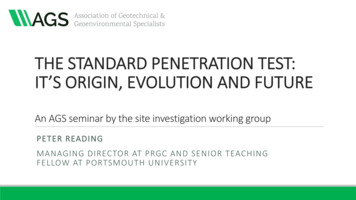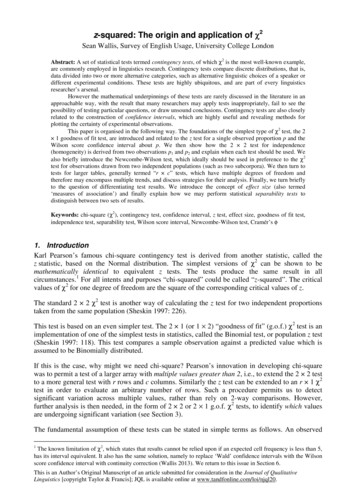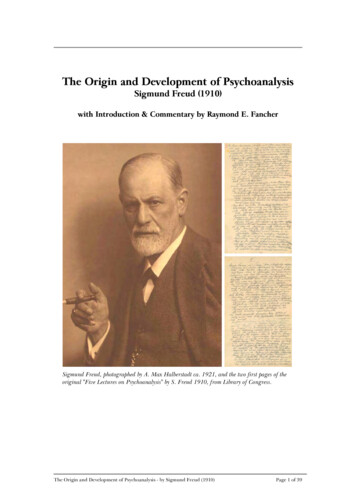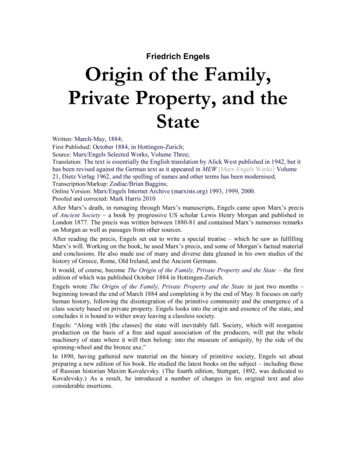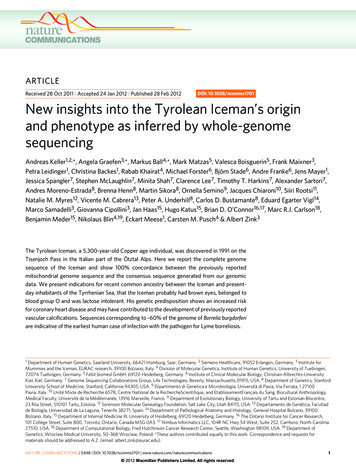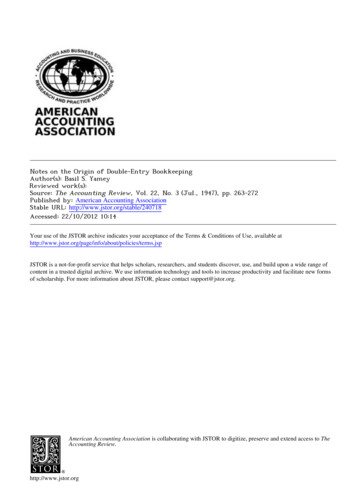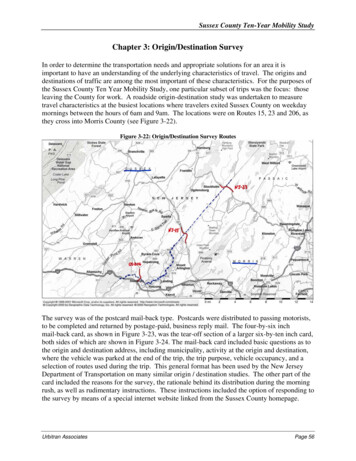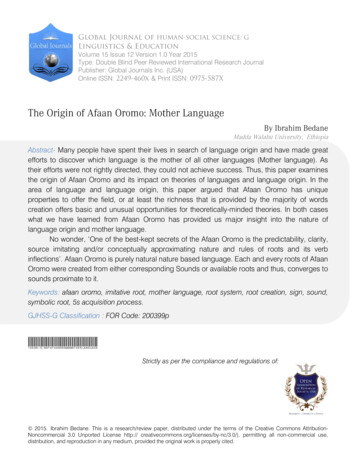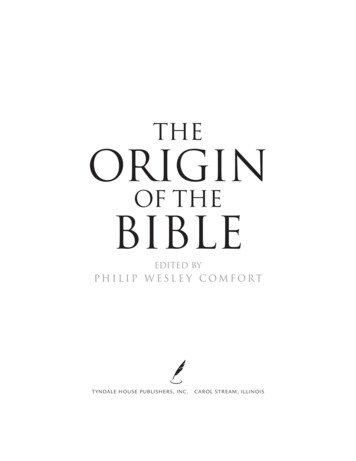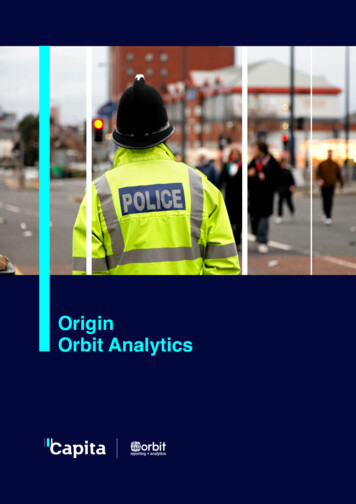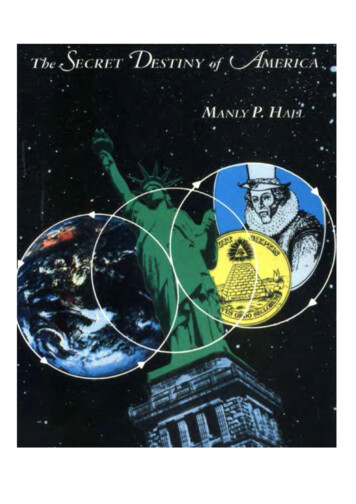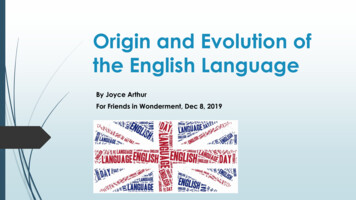
Transcription
Origin and Evolution ofthe English LanguageBy Joyce ArthurFor Friends in Wonderment, Dec 8, 2019
2– the global “lingua franca” English is mainly a mix of Old High German, Old Norse, andAnglo-Norman (with possible Celtic influences) English has largest vocabulary of any language, with over615,000 entries in OED English is only language with a thesaurus of synonyms Average active vocabulary of an English speaker is about20,000 words Only 1,000 common words found in 89% of everyday writing 11% of the English language is just the letter E 43 words account for half of all words in common use. A dozen words account for at least 25% of all words: and, be, have, that, it, in, of, the, a, to, will, I, you
Language Speakers3L1 First languageL2 Second languageLanguageL1 speakersL2 speakersTotal1. English2. Mandarin3. Hindi4. Spanish5. Arabic6. French7. Bengali8. Russian9. Portuguese10. French11. Indonesian12. Urdu12. German13. Japanese14. Swahili15. Marathi379 million91834146029077228154221764369761281683753 million19927474132208371041315315510256182121.13 billion1.12 billion615 million53442228026625823422919917113212998953
4Origin of English English is one of about a dozen similar languagesthat began as a single language, known asProto-Germanic It developed in southern Scandinavia, original homeof the Germanic tribes, who later expanded intocontinental Europe Closest relative to English is Frisian, a Dutch variant English absorbed large numbers of words fromScandinavian, French, and Latin, and later otherlanguages.Dec 8, 2019
5Brittanic History Celts lived throughout Europe (from around 400 BC), but weremarginalized to Ireland, Britain, and Brittany by time of Roman conquest in43 AD (which lasted to about 200 AD). Saxons, Angles, Jutes, and Frisians began arriving in British Isles in449 AD from what is now Denmark, North Germany, and Friesland. Theyspoke Germanic languages that came to be known as Old English orAnglo-Saxon. Anglo-Saxons were dominant in most of England and southern Scotland. Cornwall, Ireland, Wales and northern Scotland remained largely Celticspeaking. Danish and Norwegian Vikings invaded in 787, and again in 991,eventually controlling much of Britain. They spoke Old Norse, a closerelative of Old English. (Danish dynasty ends in 1042.)Dec 8, 2019
6Brittanic History (2) Norman conquest of 1066 occupied Britain, South Wales, andIreland. Normans came from Normandy in northern France – they were amix of local French people and Vikings from Norway(who arrived 9th century). Normans spoke a French dialect. For next 300 years, French is thelanguage of government, the arts, and learning in Britton. 100 years’ war with France (1337-1453) ended with defeat ofFrench. Anglo-Saxon language gradually merged with Norman French tobecome "Middle English". This evolved into modern English. About 30% of English wordscome from French, mostly from the Normans.Dec 8, 2019
7Spoken vs. written English Written language is more formal and slower to change.Spoken language constantly evolves – written language catches up later.It’s impossible to keep living languages “pure.”Old English had gendered nouns like other Germanic languages.Spoken language tends to become simplified – elites spoke more “purely” thanpeasants, who were mostly illiterate. Introduction of formal French into England at Norman conquest (1066) meantend of writing in English. When written English came back over 12th / 13th century, it was “MiddleEnglish” and had lost a vast amount of grammar. The loss of gendered nouns meant the loss of gendered adjectives and adverbs. Many words that started as nouns became verbs in English with no spelling orending changes – e.g., view, silence, rule, outlaw, worship, ban, ship, drink, fight,fire, sleep, copy. Modern examples: impact, fax, friend.Dec 8, 2019
8Celtic origins of “do” and “ing” Meaningless “do” (or “dummy do”) is used only inEnglish: How do you do? Don’t do that. Did you do this? English is the only Germanic language to use a verbnoun progressive (“I am singing”) as the primary wayto express present tense. Both conventions occur only in Celtic languages: Goidelic branch: Scottish Gaelic, Irish Gaelic, Manx Brythonic branch: Welsh, Breton, Cornish, GaulishDec 8, 2019
9Language Similarities:“Do you like apples?” FrisianFynsto fan appels?Like you of apples? DutchHou je van appels?Like you from apples? AfrikaansHou jy van appels?Like you from apples? GermanMagst du Äpfel?Like you apples? NorwegianLiker du epler?Like you apples? SwedishGillar du äpplen?Like you apples? DanishKan du lide æbler?Can you like apples? IcelandicErt þú hrifin af eplum?Are you fond of apples? Scottish GaelicAn toil leat ùbhlan?The will with you apples? Irish GaelicAn maith leat úlla?The good with you apples? WelshDych chi'n hoffi afalau?Are [do] you like apples? CornishYw da genes avalow?Is [do] like you apples? CornishA wodhes'ta kewsel Kernewek? Do you speak Cornish?Dec 8, 2019
10Language Similarities:“We are going to school” FrisianWy geane nei skoalleWe go to school DutchWe gaan naar schoolWe go to school AfrikaansOns gaan skool toeWe go school to GermanWir gehen zur SchuleWe go to school NorwegianVi skal på skolenWe go to school SwedishVi går till skolanWe go to school DanishVi går i skoleWe go to school IcelandicVið förum í skólannWe go to school WelshRydyn ni'n mynd i'r ysgolWe go to the school Scottish GaelicTha sinn a ’dol don sgoilWe are going to school Irish GaelicTáimid ag dul ar scoilWe are going to school CornishThera ve 'conesI am workingDec 8, 2019
11Ye Olde English Beowulf was written in Old English about 1100 ADHwæt. We Gardena in geardagum,þeodcyninga, þrym gefrunon,hu ða æþelingas ellen fremedon.Oft Scyld Scefing sceaþena þreatum,monegum mægþum, meodosetla ofteah,egsode eorlas. Syððan ærest wearðfeasceaft funden, he þæs frofre gebad,weox under wolcnum, weorðmyndum þah,oðþæt him æghwylc þara ymbsittendraofer hronrade hyran scolde,gomban gyldan. þæt wæs god cyning.Listen: You have heard of theDanish Kings, in the old daysand how they were great warriors.Shield, the son of Sheaf,took many an enemy's chair,terrified many a warrior.After he was found an orphan,he prospered under the skyuntil people everywherelistened when he spoke.He was a good king!Dec 8, 2019
12Middle English Geoffrey Chaucer wrote “Canterbury Tales” between1387 and 1400Whan that Aprill with his shoures sooteWhen April with its sweet-smelling showersThe droghte of March hath perced tothe roote,Has pierced the drought of March tothe root,And bathed every veyne in swich licourAnd bathed every vein in such liquidOf which vertu engendred is the flour;By which power the flower is created;Whan Zephirus eek with his sweetebreethWhen the West Wind also with its sweetbreath,Inspired hath in every holt and heethIn every wood and field has breathed life intoThe tendre croppes, and the yongesonneThe tender new leaves, and the young sunDec 8, 2019
13Early Modern English (1500-1800) Towards the end of Middle English, a sudden and distinctchange in pronunciation started – the “Great Vowel Shift”. Vowels were being pronounced shorter and shorter. From the 16th century, the British were in contact with manypeoples from around the world. Then the Renaissance introduced many new words andphrases. The invention of printing led to a common language in print,and brought standardization to English spelling and grammar. In 1604, the first English dictionary was published.Dec 8, 2019
14Shakespeare and Modern English Shakespeare coined over 2,000 English words andcountless phrases: Barefaced, critical, leapfrog, monumental, castigate, majestic,obscene, frugal, radiance, dwindle, countless, submerged, excellent,fretful, gust, hint, hurry, lovely, summit, homicide One fell swoopIn my mind’s eye To be in a pickleVanish into thin air Budge an inchPlay fast and loose The sound and the furyCold comfort Flesh and bloodFoul play Tower of strengthBreathing one’s lastDec 8, 2019
15Late Modern English (1800-Present) The main difference between Early Modern Englishand Late Modern English is vocabulary. Late Modern English has many more words, arisingfrom two main factors: Industrial Revolution and technology created a need fornew words British Empire at its height covered one quarter of theearth's surface, and the English language adopted foreignwords from many countries.Dec 8, 2019
16Dictionaries English has the best dictionariesin the world. 1604: A table Alphabeticall of Hard Words, by Robert Cawdrey (3,000 words) 1721: Universal Etymological Dictionary, by Nathaniel Bailey 1755: Dictionary of the English Language, by Samuel Johnson (43,000 words) 1806: Compendious Dictionary of the English Language, by Noah Webster 1884: The New English Dictionary on Historical Principles(first of 12 volumes of what eventually became OED) 1933: Oxford English Dictionary, by James Augustus Henry MurrayDec 8, 2019
17Simplified English Grammar Pronouns are largely uninflected, except that personalpronouns still have three cases: Subjective:I, you, he, she, it, we, they, who Objective:me, you, him, her, it, us, them, whom Possessive: my / mine; your / yours; his / her / hers; its; our / ours; their /theirs; whose Far fewer case forms than other languages: Possessives: English adds ‘s to end Plurals: English adds s to end of most(only 3 survivors of German style: children, brethren, oxen) Verbs have 4-6 forms: ride, rides, rode, riding, ridden(German has 16 for same word) Adjectives never change. Only known exception is blonde / blondDec 8, 2019
18Simplified Grammar / Deceptive Complexity Mercifully free of gendered nouns Minimized use of articles (the, a/an) It’s time to go to bed(most other languages need to say: “It’s the time to go to the bed”) Life is short / Between heaven and earth More sounds than almost any other language – 44 to 52sounds – vowels, consonants, diphthongs (two vowelstogether) Deceptive complexity – many common words with multiplemeanings and usages: What, right, sit, place, fine, like, line, round, make, getDec 8, 2019
19Origins of “th” sound Very rare in the world Occurs in Welsh, Icelandic, Greek, Arabic, andAlbanian, and no other languages. It goes back to Proto-Germanic, but other languageshave lost it. Pronouns “they, them, their” came from Scandinavia The word “their” is the same in English and ScottishGaelic.Dec 8, 2019
20Pronunciation There’s nothing certain about English pronunciation. heard - beard road – broad five – give fillet – skillet early – dearly beau – beauty steak – streak ache – mustache low – how doll – droll scour – four four – tour grieve – sieve paid – said break – speak ginger – finger Words pronounced differently if noun or verb: Reject, project, defect, rebel, record, convert, produce Noun vs adjective/adverb: minute, momentDec 8, 2019
21Opposite meanings Some English words have two opposing meanings.These are called contronyms: Sanction – official permission or prohibition Cleave – to cut in half or stick together Sanguine – hotheaded or calm Fast – stuck firmly or moving quickly Bolt – to secure a door or run away Ravish – to rape or to enrapture Trying – doing your best or being annoying Wind up – to finish something or start something (a watch) Quinquennial – lasts for 5 years or happens once in 5 yearsDec 8, 2019
22Fossil words Neck used to mean a piece of land, preserved in“neck of the woods” Tell used to mean count, preserved in “bank teller” Prove used to mean test, preserved in “proving ground” Other fossil words (in italics): Short shrift Rank and file Not a whit Newfangled Spick-and-span Kith and kinHem and hawRaring to goOut of kilterAt bayTo and froDec 8, 2019
23Other English eccentricities The longest English word has 45 niosis” Nine different ways to pronounce ‘ough’ in English. Thissentence contains all 9: “A rough-coated, dough-faced, thoughtful ploughmanstrode through the streets of Scarborough; after falling intoa slough, he coughed and hiccoughed.” The toughest tongue-twister in English:The sixth sick sheik’s sixth sheep’s sick.Dec 8, 2019
24Universal English words Airport Passport Hotel Taxi Telephone Bar Soda Cigarette Sport Golf Tennis Stop O.K. Weekend Camping Jeans No problem Sex appeal Knowhow InternetDec 8, 2019
25In honour ofthose trying tolearn English.Thank you!25
Shakespeare coined over 2,000 English words and countless phrases: Barefaced, critical, leapfrog, monumental, castigate, majestic, obscene, frugal, radiance, dwindle, countless, submerged, excellent, fretful, gust, hint, hurry, lovely, summit, homicide One fell swoop In my mind’s eye To be in a pickle Vanish into thin air Budge an inch Play fast and loose The sound and the fury Cold comfort .
